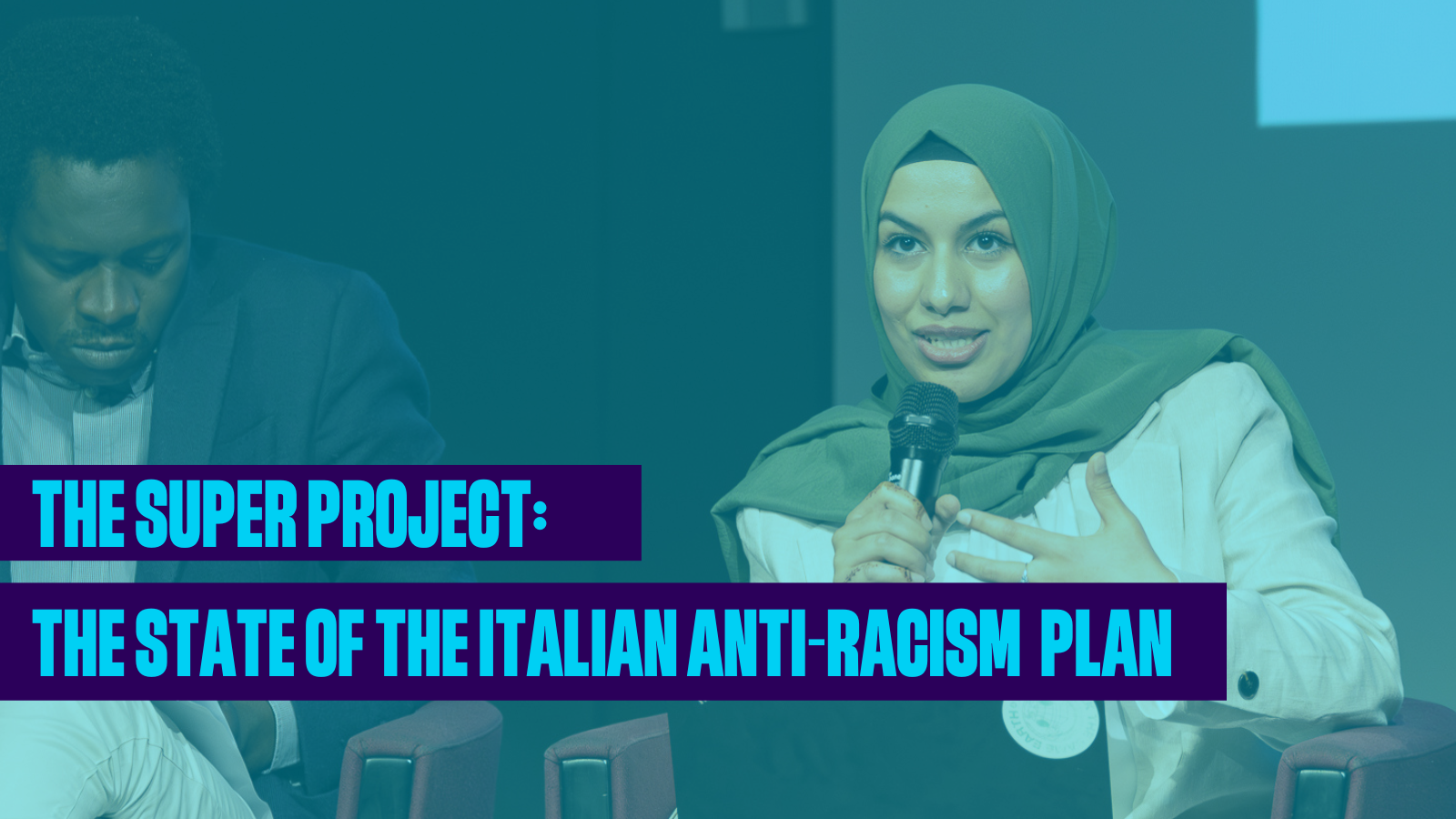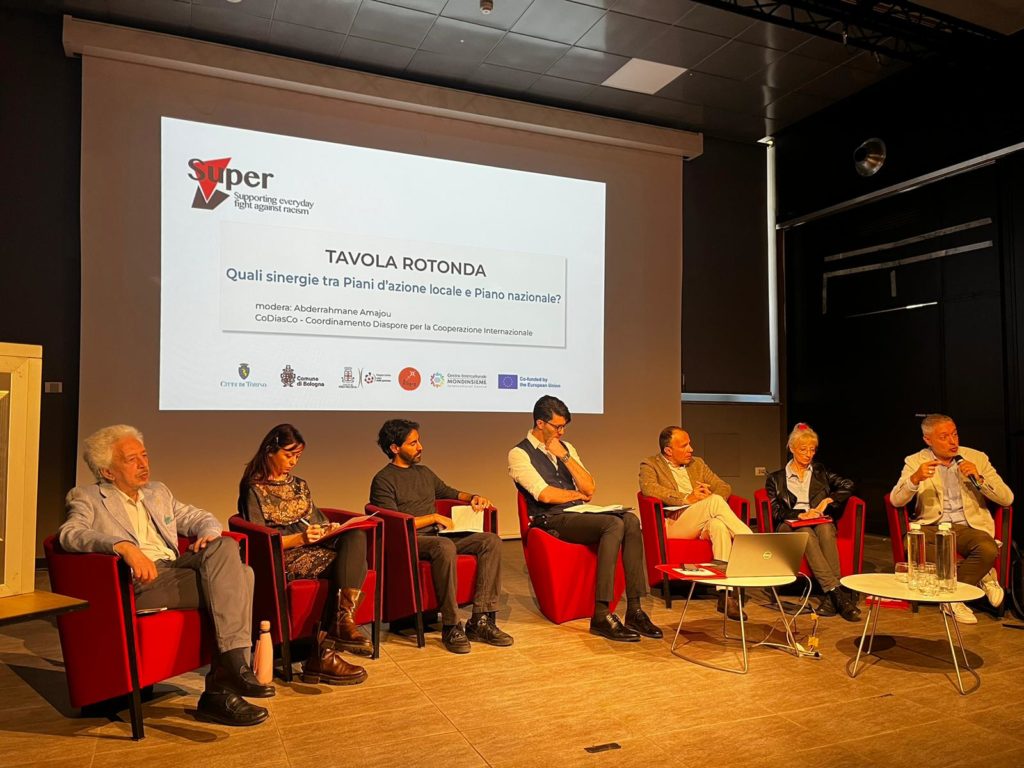
Super Project Conference: The State of the Italian Anti-Racism Action Plan
May 2023 – At the concluding Conference of the Super project (Supporting Everyday Fight Against Racism), ENAR welcomed the progress made on local and national Italian Anti-Racism Action Plans while warning about the lack of decolonial, intersectional, and educational perspectives.
On the 25th and 26th of May 2023, ENAR Policy and Advocacy Advisor Nourhene Mahmoudi spoke at the final conference of the Super project (Supporting Everyday Fight Against Racism). Hosted by the cities of Turin, Bologna, and Reggio Emilia, as well as ENAR’s member organisation Altera, the event brought together individuals and organizations committed to combating racism throughout Italy.
ENAR Calls for the Decolonialisation of the Italian Anti-Racism Plan:

In conversation with Mattia Peradotto, the Director of the Italian National Office against Racial Discrimination, ENAR welcomed the progress made on the Italian National Anti-Racism Action Plan (NAPAR) while underlining the need for:
- The recognition of structural, institutional, and systemic racism:
It is fundamental that the NAPAR clearly defines and acknowledges the existence of structural, institutional, and systemic racism. The definition will support the process of addressing deep-rooted and pervasive forms of discrimination that perpetuate racial inequality and injustice.
- The adoption of a decolonial and intersectional perspective:
The NAPAR should adopt a decolonial and intersectional perspective, integrating these principles into every aspect of the plan. To effectively tackle the complexities of racism in all its forms. It is crucial to address the historical and ongoing legacies of colonisation and acknowledge how intersecting identities can compound experiences of discrimination.
- A meaningful involvement of civil society organisations in the NAPAR designation, implementation, and monitoring processes. Civil society is the backbone of racial justice and equality advocacy and their active involvement ensures that the plan reflects the diverse needs and experiences of affected communities.
- Strengthening the financial support of civil society:
ENAR emphasised the necessity of providing adequate financial support to grassroots organisations actively working at the forefront of our joint fight for racial justice. Sustainable funding models would lend a much-needed hand to these organisations, ensuring they are able to effectively implement their initiatives, support affected communities, and continue to challenge systemic racism.
- A disaggregated and harmonised data collection:
To understand the multifaceted nature of discrimination, the NAPAR should call for disaggregated and harmonised data collection. This approach allows us to unveil the multiple patterns of discrimination experienced by diverse racial and ethnic groups. Only through comprehensive data collection can we form evidence-based policies and targeted interventions.
- Addressing structural racism in the field of migration:
ENAR maintains that Italian NAPAR must specifically and adequately address the link between structural racism and migration. This area cannot be ignored as Italy remains the first point of contact for many individuals seeking refuge in Europe.
Local Action Plans: How are Turin, Bologna, and Reggio Emilia Charting Paths Towards Equality?
The conference also showcased the remarkable progress made by the three participating cities, Turin, Bologna, and Reggio Emilia, as they presented their local Anti-Racism Action Plans. The plans, collaboratively developed with civil society organizations, aim to provide training activities for law enforcement, public employees, and community leaders. The achievements celebrated during the conference illustrated the cities’ commitment to combatting racism at the local and national levels.

To ensure the effective implementation of the presented local Anti-Racism Action Plans, ENAR further called for:
- the adoption of a decolonial perspective in the development of anti-racism policies. To effectively challenge racism in all its manifestations, including structural, institutional, and systemic forms, it is imperative to embark on a transformative journey that addresses the historical injustices and traumas suffered by marginalized communities.
- the decolonization of the educational curriculum. It is disheartening that human right abuses such as the Srebrenica genocide, a horrific event that occurred less than 30 years ago on European soil, remains largely unknown to young people throughout the continent. Incorporating such significant historical events and perspectives is imperative to broaden our collective understanding and ensure that future generations grasp the importance of fostering a more inclusive society.
- meaningful and inclusive participation of civil society organisations in further decision-making processes.



